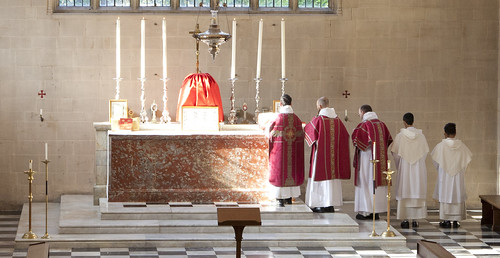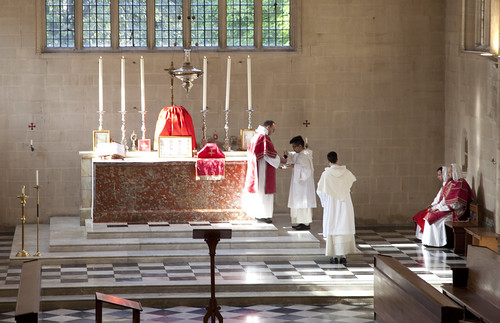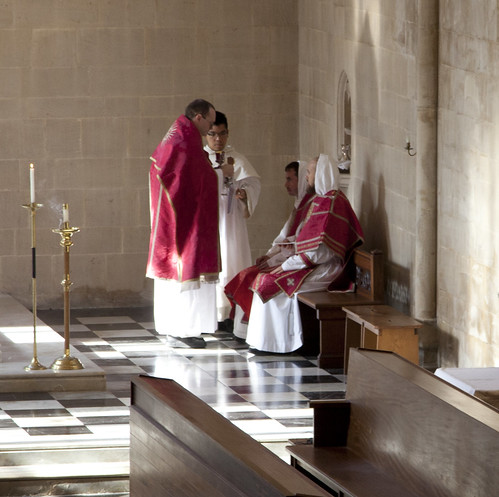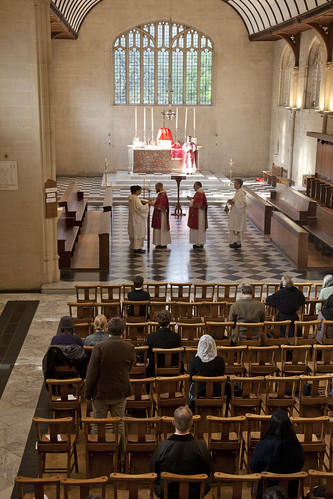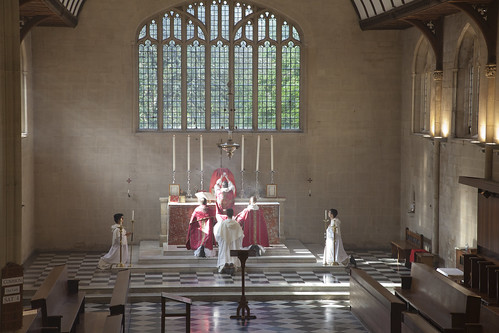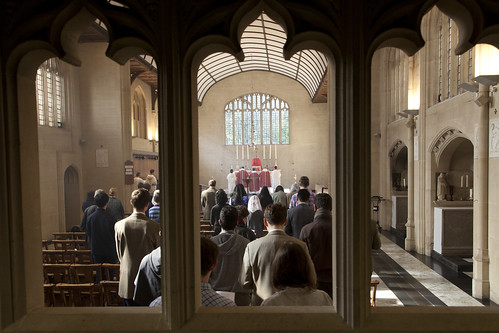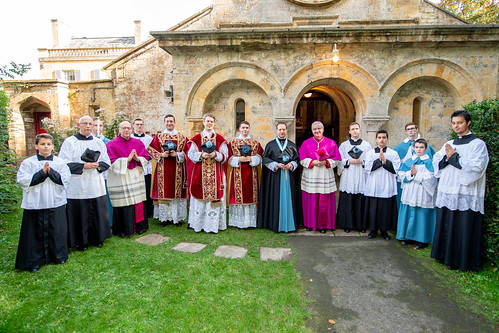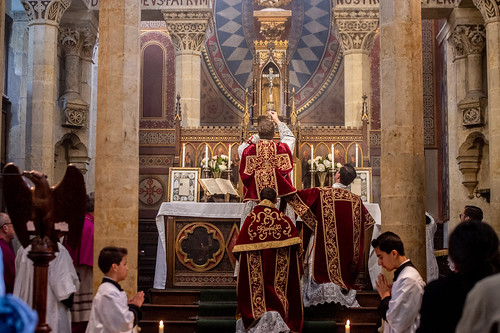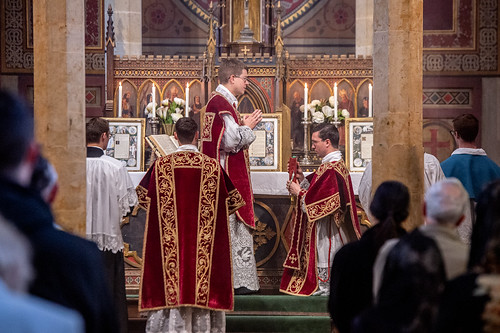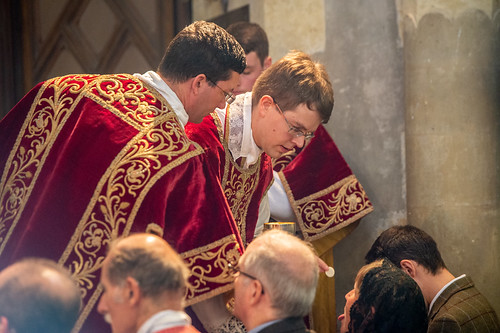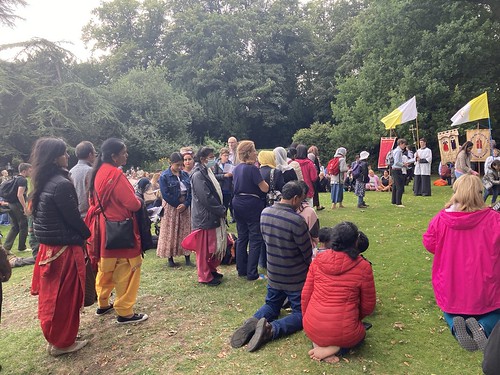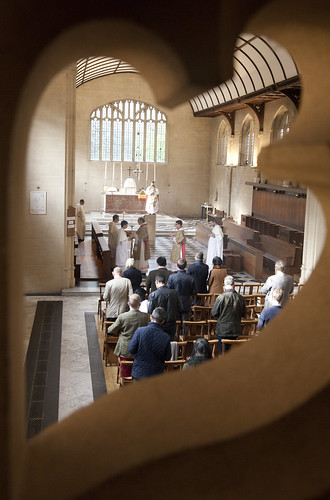Chairman's Blog
Interview with InfoCatolica
 |
| Procession to St Peters at the 2019 Summorum Pontificum Pilgrimage, Rome |
1.
What does it mean to be president of the International Federation Una Voce?
The Federation an an umbrella group for lay Catholics attached to the ancient Latin liturgy of the Catholic Church. We do not exercise authority over our members, but they come to us for advice, and we represent their concerns in the Holy See and in the world-wide media.
The Federation’s members elect a Council, currently about 20 people from all over the world, and a President; the Council elects the Treasurer and Secretary and allocates other tasks to its members. Because of the geographical spread of councillors, we communicate mainly by email and have instituted regular Zoom meetings.
The President, generally with a colleague or two, usually travels to Rome once a year to meet Curial officials, clergy, journalists, and others, to keep up with what is going on. As Secretary I have been involved in such trips for some years, and it has been very interesting. As well as concrete information, one gets a feeling for the assumptions and habits of mind which govern the Holy See. This insight is reflected in the way we carry out all our work: whether we want to appeal to these assumptions in our representations to the Holy See, or to modify them, one needs to know what they are.
2. It seems today, as things stand, the importance of this association in the defense and promotion of the traditional liturgy is clearer...
Yes indeed. There was a period of time, after Pope Benedict XVI issued Summorum Pontificum, when some people began to say that the work of lay groups campaigning for the Traditional Mass was accomplished, and even that they should shut up shop. It was a strange idea, even at that moment, because local Una Voce groups were busier than ever helping priests learn the Vetus Ordo and set up new centres for its celebration; the Federation for its part was to be consulted on the addition of new saints into the 1962 calendar, and incorporating new Prefaces into the old Missal, as indeed eventually happened. It would have been a strange time to end our work!
In fact, getting bishops to implement Summorum Pontificum was no less a struggle than had been getting them to implement the 1988 Indult, Ecclesia Dei Adflicta. The work of gathering signatures on petitions, negotiating locally, forwarding correspondence to Rome, and taking the matter up with the Holy See continued without a break.
Following Traditionis Custodes, we are back to a time of official hostility to the ancient Mass, and our work is more important than ever: it is not just a matter, now, of getting concessions out of a bishop here or there, but of the very existence of the Vetus Ordo as part of the life of the Church.
The current situation is more akin to that faced by the early leaders of the Federation, such as our founder President, Dr Erich de Saventhem. He faced officials in the Holy See who were convinced that even asking for the Traditional Mass was a failure of loyalty to the Pope. Although Pope Francis has not tried to forbid the celebration of the old Mass, the official programme is now that it should disappear in time.
This official hostility places clergy supportive of the Traditional Mass in a very difficult position. It is vital that lay Catholics, properly organised and well-informed, continue to speak up for them and the ancient Mass itself.
3. On July 4, just before the promulgation of Traditionis Custodes, Una Voce sponsored an announcement in a Roman newspaper, asking Pope Francis in vain to be generous with the Roman rite.
Yes we did. It was an unusual step for us but there were a number of precedents for using this form of communication: petitions in favour of the Traditional Mass were published in newspapers several times in the early days, with some very distinguished names. Jacques Maritain, so influential over Paul VI, appeared on one in 1966, and the famous English petition of 1971, fifty years ago this month, actually achieved its object, in a limited way, with permission for the Mass in England and Wales.
We usually prefer either private exchanges with the Holy See, or taking part in measured public discussion. The previous July we had sent to the Congregation for the Doctrine of the Faith a report about the implementation of Summorum Pontificum in 368 dioceses in 56 countries, to supplement the information they had been receiving from bishops in response to their questionnaire about the Traditional Mass. In the previous year, 2019, we published a book of our ‘Position Papers’ on aspects of the ancient liturgy, a contribution to the debate about its continuing relevance and value.
Although the newspaper advert did not avert Traditionis Custodes, like our other interventions it contributed to the general perception of the situation by the Catholic and the secular press. No one could understand why the Pope had acted so harshly to a group of Catholics who simply wished to worship using a older form of the Catholic liturgy.
4. This is why this year's Summorum Pontificum pilgrimage is more
important...
Yes, this year’s pilgrimage is an opportunity to make it clear that we have not gone away, and also that even under Traditionis Custodes we are being welcomed into Rome’s ancient basilicas.
The success of the Traditional Mass in attracting young people and families, in particular, especially since 2007, has been impossible to deny. Growing from a low base, and often having to contend up with official discouragement and difficult conditions, in many countries the Vetus Ordo has become focus of spiritual revival. As Diane Montagna has suggested, citing the 13,000 people who attended the Chartres Pilgrimage before Covid in 2018, this may even make those uncomfortable with it more determined to crush it. This popularity, nevertheless, is ultimately the guarantee that it will survive.
5. In addition to Una Voce, there will be other associations who pursue the same purpose....
Yes indeed. The Summorum Pontificum Pilgrimage is supported not only by the Federation, but some individual national Una Voce groups, such as the Latin Mass Society of England and Wales and Pro Missa Tridentina of Germany, the organisers of the Chartres Pilgrimage, Notre Dame de Chrétienté,
, Paix Liturgique, and a number of smaller lay associations supportive of the Traditional Mass. The event helps us all to keep in touch: a truly international and fraternal movement, closely aligned with the Traditional Priestly Institutes, and with many friends in the Catholic and secular press and academia.
6. How can Catholics around the world support the Federation and keep up with its work?
If you live in a country where there is no Una Voce group affiliated to the Federation, establish one, or offer to be a local contact for us: as well as member associations, we have ‘National Correspondents’ in a number of countries where organising a lay association would be too difficult.
Individuals can also support the Federation with a small annual donation and become a ‘Friend’. We organise a Mass every month for these Friends, for the living and the deceased. They also receive our magazine and other bulletins.
Our magazine, Gregorius Magnus, comes out twice a year, and reports on our work as well as showcasing the activities and reflections of members from all over the world.
Summorum Pontificum Pilgrimage: 29-31 October
I will be there! The Latin Mass Society is part of the organising board for the pilgrimage.
Support the Latin Mass Society
The Last Rites and the Emergency Services
As the United Kingdom has secularised, so the role of Christian ministers has diminished. If you read stories of natural crises from fifty years ago, priests and Anglican vicars are often involved. At the 1966 disaster at Aberfan in Wales, when a heap of spoil from a coal mine engulfed a school, the local vicar was practically the only person regarded as having responsibility for the emotional and spiritual trauma suffered by the people of the town. One of the most memorable images from the “troubles” of Northern Ireland is of a Catholic priest waving a white handkerchief, escorting a group of people carrying an injured man to safety, on “Bloody Sunday” in 1972. Times, sadly, have changed.
As the role of the Church has diminished, so have priests’ opportunities to make a positive difference. Last week a prominent Catholic Member of Parliament, David Amess, was stabbed by (apparently) an Islamist fanatic. As he lay dying, a Catholic priest was refused admission through the police cordon to give him the Last Rites. The priest seemed to accept the explanation: Amess, surrounded as he was by police officers and medics, was in a “crime scene” which couldn’t be disturbed by anyone as trivial as a priest.
LMS Oxford Pilgrimage: photos
LMS Pilgrimage in honour of the Chideock martyrs
The Traditional Mass and Diversity
 |
| Venerating Our Lady of Walsingham at the end of the LMS Walking Pilgrimage in August this year. |
In a recent article in the Illinois Times, Massimo Faggioli, a theology professor at Villanova University in Philadelphia, is quoted as follows, of a specific Traditional Mass location:
It’s not an accident that all of these Catholics at the old Mass are white, because one of the things that happened after Vatican II was an ‘inculturation’ of the liturgy. …The Latin Mass is white and European by its definition, because it’s a product of the Catholic Church of the 16th century. So, this is creating serious problems because it is never limited to the liturgy only, but it is always the first step to saying Vatican II was a disaster.
I would far rather ignore these childish accusations, but I fear that if they are repeated frequently enough without rebuttal they will become established as part of the liberal narrative about the Traditional Latin Mass. But in order to shoe-horn the movement for the ancient Mass into the role of the bad guys in some racially-charged political confrontation, Faggioli needs to distort the past and ignore the present. Let’s start with the past.
Read the whole thing there.
New edition of the FIUV's magazine: Gregorius Magnus 12, Winter 2021
Reactions to Traditionis CustodesFrom members' magazines: Peter Kwasniewski on proclaiming the Gospel to the north; Pope Francis and Dante; Remembering Mgr Richard Soseman; Cardinal Merry del Val.Features: J.R.R.Tolkien by Robert Lazu Kmita; Traditional walking pilgrimage in Spain.50th Anniversary of the English Indult; Petitions from 1966 to 1997.
Support the Latin Mass Society
Part time job vacency in the LMS
The Latin Mass Society is unique among Una Voce groups around the world in having a permanent office and paid staff. Above is a picture of our office which I took when we moved into it (from a smaller one) in 2009. It is big enough to have volunteers working in part of it, and for schola rehearsals in the evenings and vestment mending on Saturdays. It located in Holborn, London's theatre district, not far from Corpus Christi Maiden Lane.
We have two full-time members of staff, two freelancers (our publicist and our magazine editor), and, usually, a part-timer. Our previous part-time employee is moving to Canada, so we need to replace her.
Details below.
The Latin Mass Society has a vacancy for a part-time Office Assistant, based in Holborn.
KEY AREAS OF RESPONSIBILITY
Office administration - The Office Assistant acts as the principal secretary for the LMS office. This includes general correspondence, answering telephone calls, post and emails.
Membership administration - The Office Assistant is responsible for the membership database (CiviCRM), membership renewals, data entry, data analysis, data export (print or email mail-merges).
Mail-order - The Office Assistant is responsible for the administration of the LMS online shop (Drupal Commerce). This includes stock replenishment, stock management, product updates/additions and order fulfilment (picking, packing & mailing).
Information administration - The Office Assistant is responsible for compiling information which pertains to the Charity, including research and document publication and distribution.
Volunteer administration – The Office Assistant is responsible for overseeing office work undertaken by volunteers.
Other tasks as determined by the General Manager.
The full job description and details of the application process can be found here. Closing date for applications is Friday 22nd October 2021.
LMS Pilgrimage to Oxford, 11am Sat 16th October, Blackfriars
At 11am the Dominicans will be celebrating for us a High Mass in honour of the Martyrs of Oxford University. It will be accompanied with Dominican chant and polyphony.
Online stole making course from the Guild of St Clare, 30th October
 |
| An 'off line' Guild event |



